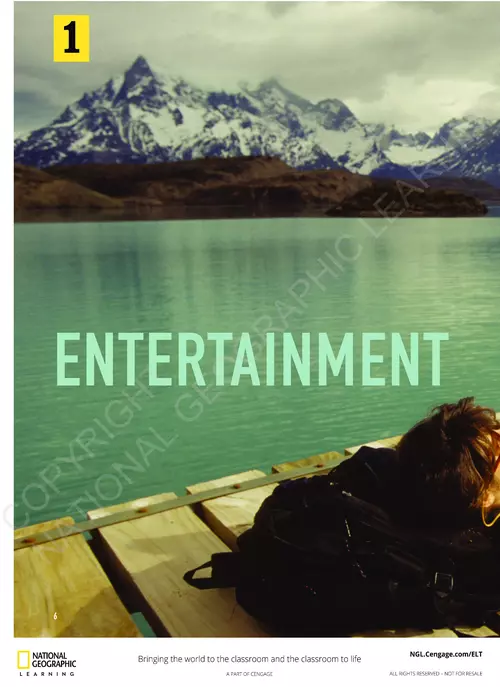
COPYRIGHT NATIONAL GEOGRAPHIC LEARNING
COPYRIGHT. NATIONAL GEOGRAPHIC LEARNING Check your ideas on page 166 and do Exercise 1. We use the present and past simple and a number of.
adsPart of the document
93386_01_u1_p006-013.indd 601/12/2014 08:54
COPYRIGHT
NATIONAL
GEOGRAPHIC
LEARNING
IN THIS UNIT YOU LEARN HOW TO:
• talk about habits
•
describe films, books and music
•
politely disagree with opinions
•
talk about pictures and art
•
tell stories and discuss plots
SPEAKING
1 Work in pairs. Look at the photo and discuss
the questions.
• Where do you think the place is? Would you want
to read in a place like this? Why? / Why not?
•
Do you usually take a book with you when you're
travelling or do you prefer e-book readers
?
•
What's the nicest or most unusual place you've spent time reading
?
2 Change partners. Tell each other about your
other interests and how you spend your free
time. Think about TV, music, films, sport and
hobbies. Find five things that you have in
common.
Unit 1 Entertainment 7
93386_01_u1_p006-013.indd 701/12/2014 08:54COPYRIGHT
NATIONAL GEOGRAPHIC LEARNING
3 In Exercise 2, find:
? two ways we talk about a past habit.
?
one verb
that describes a current habit - it means
usually
or
generally
.
?
two other structures we use to talk about current
habits.
?
phrases that mean always
,
(not) normally
,
sometimes
and
almost
never
.
Check your ideas on page 166 and do Exercise 1.
4 Complete the sentences about your own leisure
interests. Then find out about your partner. How
much do you have in common?
? I ... all the time.
?
I don't ... as much as I used to because ...
?
I tend to ... at the weekends and now and again I ...
?
As a rule, I don
't ... , but I will if ...
?
I used to ... a lot. I'd ...
For further practice, see page 166 and do Exercise 2.
5 Write five Do you ... much? questions about other ar
eas.
Think a
bout:
• work
•
study
•
holiday
•
eating
•
family
Then find out about your partner. Use some of the str
uctures from Exercise 2 in your answer.
LISTENING


